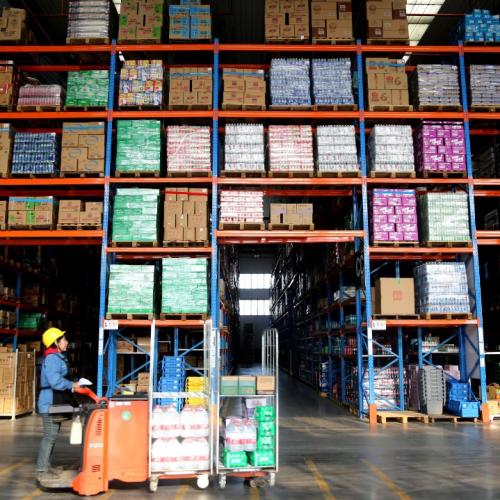




Chinese shoppers swarmed to e-commerce platforms and snapped up discounted items worth hundreds of billions of yuan during this year's Singles Day shopping extravaganza, pushing up the sales of domestic brands and premium goods.
Experts said this indicates the enormous vitality and resilience of the country's consumer market.
As China's biggest shopping event of the year, the Double 11, or 11-11, promotional gala, which began in late October and peaked on Saturday, has played a vital role in stimulating people's purchasing appetites and bolstering the recovery of consumption and economic growth, they added.
Past Double 11 festivals were characterized by record-smashing gross merchandise volume, or GMV, through discount-led sales. However, chasing high GMV is no longer the focus, industry observers said, noting that Chinese shoppers are becoming more rational and carefully reviewing their needs, with an emphasis on quality and value.
Tmall, Chinese tech heavyweight Alibaba Group's business-to-customer platform, said that 402 brands, including 243 domestic ones, saw their sales surpass 100 million yuan ($13.7 million) from 8 pm on Oct 31 to midnight on Saturday. The turnover of 38,000 brands surged more than 100 percent year-on-year during this period.
Neither Alibaba nor JD, another prominent e-commerce platform, disclosed specific GMV figures for this year's shopping spree. Alibaba said only that the scale of users and merchants registered "remarkable "growth, which drove the overall growth of order volume and GMV.
JD said its transaction volume, order volume and user engagement "reached record highs". The sales of over 60 brands surpassed 1 billion yuan, and nearly 20,000 brands witnessed their turnover increase threefold year-on-year over the weekslong promotion gala.
Young Chinese consumers increasingly opt for high-quality homegrown brands, with the spending from the post-1990s and post-2000s generations accounting for 62 percent of the total sales of domestic brands, it added.
Moreover, turnover of high-end electronic devices surged on JD's online marketplaces, with foldable smartphones up 300 percent, digital cameras higher by 100 percent, and gaming laptops up 50 percent during the shopping spree.
"Consumption has become the main driving force boosting China's economic growth, and the Singles Day shopping festival is pivotal to unleashing consumers' purchasing potential and promoting the recovery of the economy," said Wang Yun, a researcher at the Academy of Macroeconomic Research affiliated with the National Development and Reform Commission.
According to Wang, domestic brands, especially those featuring creative designs incorporating traditional Chinese elements, are gaining popularity among China's younger generations, who have a growing sense of national pride and confidence in Chinese culture.
Added significance
This year's Double 11 promotion has added significance, as it was the first since China optimized its COVID-19 response measures, Wang said, adding that the country's consumer market has gained growth momentum, with the overall growth rate expected to reach about 7 to 8 percent this year.
Major e-commerce players emphasized low prices and made their promotion methods simpler during this year's Singles Day shopping carnival, with direct price cuts being a preferred strategy.
Britton Russell, who leads the consumer and retail practice at global consulting company Alix-Partners' China division, said that"2023 marks the first post-pandemic Singles Day, where consumption returns to normal levels. We are seeing stronger sentiment and spending, evidenced by the 18 percent increase in total spending compared with 2022".
While value-based shopping is nothing new, consumers are more prudent and knowledgeable about potential purchases than ever before, as they seek maximum value with every purchase, he said.
Russell also emphasized that "rational consumption drives the search for quality rather than flashy promotion".
Jason Yu, general manager of Kantar Worldpanel China, a market research provider, said that Chinese consumers were more value-conscious during this year's shopping spree. "They hope to buy cost-effective commodities, rather than just obtaining low-priced goods at the cost of quality."
China's consumption market recovered in the first three quarters of this year. Retail sales, a significant indicator of consumption strength, grew 6.8 percent year-on-year during the January-September period, according to the National Bureau of Statistics.
Chinese shoppers are also willing to devote their attention to more novel platforms that blur the boundaries between entertainment and retail, particularly in livestreaming e-commerce provided by short-video platforms such as Douyin and Kuaishou, a report from consultancy Bain& Co said.
If you have any problems with this article, please contact us at app@chinadaily.com.cn and we'll immediately get back to you.